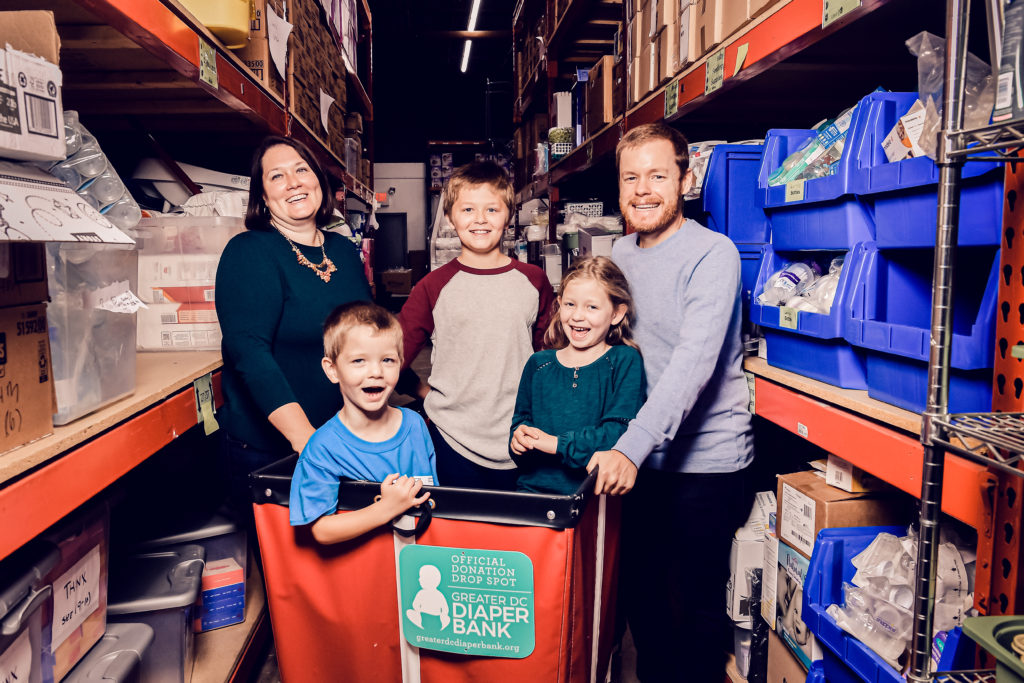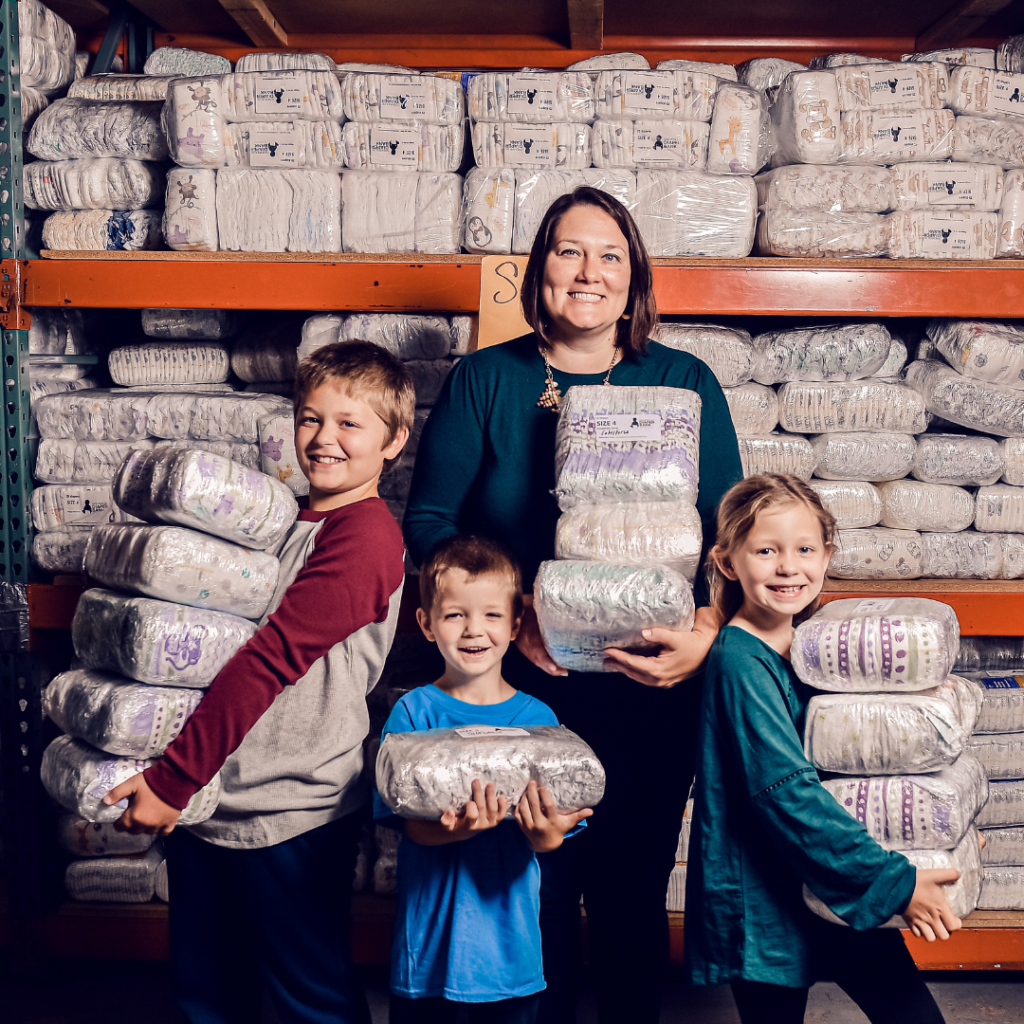
Corinne Cannon doesn’t mind admitting that she struggled through the first year of motherhood. “I thought I was ready to be a mom. But then I had Jack and everything I had read about motherhood paled in comparison to the reality of being a parent,” she says.
Despite the challenges she faced as a new mom—or, perhaps, inspired by them—Cannon had the urge to help other families raising infants and toddlers and founded the Greater DC Diaper Bank (GDCDB) on Jack’s first birthday. The nonprofit organization, which provides diapers, baby care items and personal hygiene products to low-income families across the DMV, just celebrated its 10th anniversary in October and is on track to distribute 7 million diaper by the end of the year—a 350% increase over 2019.
Cannon lives in D.C. with her husband, Jay Williams, and their children: Jack, 10; Callie, 7; and Finn, 4. We spoke to her recently about how she’s been juggling her duties as executive director of GDCDB and as a mom of three during a pandemic.
You founded the Greater DC Diaper Bank in 2010, the day before your son Jack’s birthday. That first year of motherhood can be particularly challenging for new moms, yet you were able to get a nonprofit up and running. What was your motivation for starting a diaper bank, and how were you able to make it happen?
Never underestimate what a new mom motivated by rage and little sleep can do! Our first baby, Jack, was a beautiful and extremely difficult newborn. He was colicky and hated sleep—he nursed every three hours for the first six months of life. And I was simply floored by how hard it was to care for him and myself. My whole understanding of myself and my place in the world was upended: I was getting minimal sleep, my marriage changed overnight and my body was in recovery.
The diaper bank started one night when Jack was about five or six month old and had been crying for hours. After trying all the things I knew to do to make him stop I suddenly had an overwhelming urge to hit him—and it startled me.
I remember putting him down very gently in his crib and going to get my husband. As I lay in bed and cried, I started to think about other women and other mothers. If I was struggling and had everything going for me—Jack was planned, we had enough money, we had family support, my husband and I loved each other and were both fully involved—what was happening to the mom who had no one to go wake up or no idea how she was going to feed her baby next week?
After that night I started doing a lot of research and making calls—I must have sounded crazy to people. I had a baby fussing in the background, and I’m asking how I can help other moms! I think I realized early on in Jack’s life that I was going to be exhausted no matter what, so I better damn well do something that was worth the exhaustion.
In terms of making it happen, it was a lot of incredibly hard work and long hours. I called the Diaper Bank my “8 p.m. to midnight” job for years. I was dogged; I would talk to anyone and ask for help widely. I was convince that people didn’t know this was an issue and that if they learned about it they would want to help.
GDCDB just celebrated its 10 year anniversary in October. How has your role changed over the years, and what do you love most about your job?
When just starting out, I wore many hats, mostly trying to figure out how this work fit into the larger nonprofit landscape and how we could compliment what existed rather than reinventing the wheel. I did a lot of reaching out to other organizations to learn about their services and how we could partner to make an even bigger impact in our community.
For the first five years I was the sole employee and worked pro-bono for four of them. I was running the diaper drive and the fundraising and the programs.
Forming an entire ambassador program where hundreds of like-minded people help spread the word about who we are has allowed me the opportunity to focus on growing the organization. Today I’m a lot more focused on creating the policies and the structure for this work to expand and help even more folks—doesn’t sound sexy, but putting real time and energy into HR policy and budgets is where I can have the most impact now.
What I love is that people understand the need right away. I love that it opens up empathy windows in people’s hearts to think about the reality of parenting in poverty. I love our team and the volunteers and ambassadors we attract. We have an army of amazing people who are working diaper by diaper and period product by period product to build the community we all want to live in.
What has it been like virtual schooling three kids under 10? How have you been able to juggle that new responsibility with your work at the Greater DC Diaper Bank?
Oh, there is no juggle! There is a lot of scrambling, falling, getting up again, crying, laughing because you want to cry and letting go. It’s hard in a way that reminds me very much of the newborn phase of parenting: too many people want too many things you cannot give at the same time, and you’re always tired and hungry.
There’s an added layer of difficulty in being alone in all of this. I derive so much of my energy from being with others—socially distancing takes a different kind of toll on extreme extroverts like me. My husband and I are surviving, I think (!!), by doubling down on communications, dividing and conquering and being OK with things being not OK. Every night we triage the next day—who has what meeting, who needs to be where, who needs an hour of uninterrupted think time or the consequences will be dire—and we figure it out. At the end of each day we’re always amazed we did it!

How have you been taking care of your physical and mental health during the pandemic?
I will fully admit that there are ebbs and flows. We are a Peloton family, and early on in the pandemic and through the summer, I used that and daily walks with our kids like therapy. Lately the schedule of school has made dedicated exercise time less possible. I’m focusing heavily on sleep and on talking to friends—text chains are magical. Rom-coms are also a go-to crutch.
What are a few things that you and your family love to do together at home or around D.C.?
We are a biking crew! We all ride—our youngest moved to a two wheelers early on in the pandemic—so we take family bike rides and lots of walks. In the spring and summer we visited every park within a 20-minute drive. Getting outside is key.
Many families are thinking about gratitude and generosity this time of year. What are some ways that parents can get their kids excited about giving back to the community?
Kids are far more excited by the idea of giving back and helping if they are the instigators. Ask your kids what they think needs to change in the world. What problems do they see that they want to fix? What change do they want to create and how do you best go about it? Do your research into these issues together.
So many organizations are being challenged with coming up with creative ways to volunteer and or give back—so find an organization and have your children get involved virtually. There are lots of needs right now and whatever skill or ideas or dollars you have to give are going to be appreciated.
A version of this story originally appeared in the November 2020 issue of Washington FAMILY.







